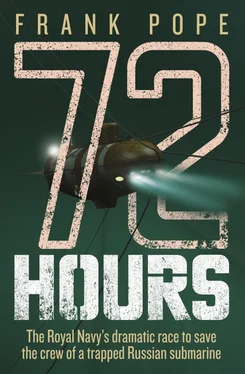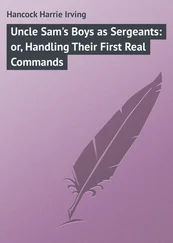The streets of Petropavlovsk were dimly lit by irregular streetlights that caught looming shapes of concrete buildings, sections of huge pipework and occasional wisps of escaping steam. Cavernous potholes forced the bus to a near standstill at traffic lights. No one was on the streets, and there was hardly a car in sight. There was silence in the bus as everyone peered into the darkness, all lost in their own thoughts. It had begun to rain again.
At the edge of town the bus slowed, and turned on to a dirt track. As it headed into absolute blackness the atmosphere on the bus changed. This couldn’t be the main road to a military port, Riches thought. The Russian officers on board – one of whom had delighted in revealing that he worked in Intelligence – were talking between themselves in low voices, and even the interpreters were starting to look uncomfortable. The thought crossed Riches’ mind that they were being taken to a dark corner of the city to be despatched, as if they were in some John le Carré spy story.
Then a glow appeared ahead, against it the silhouettes of defunct looking cranes and crumbling storage facilities. Soon they could make out the side of a rusting ship lit by yellowing spotlights. An officer announced that this was the Georgy Kozmin , AS-28 ’s mothership, that had returned from the site in order to host the American rescue team. Only her stern was tied against the dock; her bow was held out in the bay by two anchors. It was a strange way to be moored as it made loading difficult. It was common in crowded Mediterranean marinas, but there was no other ship close to the Kozmin . Then again the dock didn’t look like anything Riches had ever seen before: it was more muddy field than concrete jetty. The Americans were in for a tough time, he thought. Just getting the vehicles down here with all their equipment was going to be bad enough; transferring it on board was going to be a nightmare.
There was no time to commiserate. The US advance party was dropped off and the bus turned straight around, threading its way back up the dirt track to the main road and then onwards to the port. Finally it pulled up to the gate, rain streaming down in front of the floodlights and rattling the roof. The tension in Riches’ chest released a fraction when he saw the entrance. They’d arrived. Finally they were going to be able to do what they’d come all this way to do.
Then the guard stepped from his hut. His body language was wrong. Kalashnikov at the ready, he marched up to the window and began barking questions at the driver. The Russian officers stepped out into the rain and began explaining who the party were, but the guard was having none of it. Riches had been told of Captain Holloway’s delay at the gate, but assumed that now everything had been explained their admission would be a short formality. At last the guard agreed to call his superior and after ten long minutes another official approached the inside of the gate, hunched against the rain. He demanded all of the team’s passports, then disappeared.
More minutes rolled by. Riches asked the Russian translators what was going on, but they shrugged their shoulders. He asked them to find out, but they shrugged again. He called Captain Holloway, but got no answer. Then he got out of the bus and hailed through the fence to the guard.
‘Hello! We are here at the request of the Ministry of Defence, on an urgent mission. You have to let us in!’ he called.
The guard ignored him.
‘Guard! Time is running out! Come here and explain the delay!’ Riches shouted, hardly able to control the frustration in his voice. He was standing in the drenching rain, yelling and waving his arms, but the guard would not even look his way.
Riches climbed back in the bus, slammed the door and swore. He took a deep breath. This delay was not a major problem, he told himself. Holloway and the others were already inside and they’d be let in eventually. It didn’t help. Maybe he was still tired from the flight, but black thoughts were returning. If they’d had this much trouble just getting to the ship, what was waiting for them when they headed out to sea?
Saturday, 6 August
SS + 54 h 35 mins
11.05 UK – 14.05 Moscow – 23.05 Kamchatka
AS-28 , 210 metres beneath Berezovya Bay
Captain Lepetyukha’s one good lung was labouring hard from the increased carbon dioxide level, and the cold had now penetrated into his body’s core. He was trying to focus on keeping the crew under control, but it took him minutes on end to recover after speaking even a short sentence. He could see the others struggling too, and having to rest after every movement.
Popov and Ivanov, two of the younger Warrant Officers, had begun vomiting, a sign of oxygen deprivation. Lepetyukha was stretching the endurance of the V-64 canisters too far. He relented, and ordered a new one to be opened.
Everybody was drowsy, numbed with cold and crazed with thirst, but order had to be maintained. Lepetyukha commanded Milachevsky to keep making the hourly report. All through that long night he sent them, telling the world above that pressure on board AS-28 was normal, and the temperature stable at 4°C in the front compartment, 8°C in the aft.
In tough times Russian men often resort to a rousing song to keep up their morale, but Lepetyukha had banned all singing in the interests of conserving air. Not that anyone in the cramped, drip ping compartment would have the energy.
Sergei Belozerov, the 34-year-old electromechanic, was still working to keep the spirits of his fellow sailors from sinking too far. Whenever his watch showed it was time for breakfast, lunch or dinner aboard the mothership, Belozerov hauled him self up from the huddle and passed out the crackers with great ceremony.
The dry fragments of cracker stayed sharp on their tongues for what seemed like hours afterwards. Worried by the tiny reserve of water remaining, Bolonin had cut their water ration to only two mouthfuls of water each per day. Lifting the mug took such an effort that they needed to rest for 15 minutes afterwards, but the sailors looked up gratefully at Bolonin as he passed it around.
With Captain Lepetyukha all but incapacitated on the floor, the experienced submariner and civilian engineer had become the one to whom they were all looking for guidance and hope. Although respectful, they could be more familiar with him than with their captain. As Milachevsky relinquished the water mug, he looked up at Gennady Vasiliyevich Bolonin and with a grim smile said, ‘Well, Vasiliyevich, you have not quite made it to your sixtieth birthday.’
Bolonin nodded. ‘Perhaps. But you will make it to yours. I know this British system of rescue very well. You will see,’ he said with as much confidence in his voice as he could muster. He did know all about the international rescue community, and knew that with their involvement their chances of escape were indeed growing. But he also knew how much still stood between them and the fresh, warm air above.
Saturday, 6 August
SS + 54 h 45 mins
11.15 UK – 14.15 Moscow – 23.15 Kamchatka
On board KIL-27 , Petropavlosk-Kamchatsky docks
The naval architect Marcus Cave had grave reservations about the strength of the roofing where they needed to weld the 6-tonne Effer crane. Not only was the upper surface rusting away, but so too were the supports beneath it. That didn’t bode well for the steel in between. Like everyone on the team, he was suffering waking nightmares of his being the weakest link that spelled the end for the Russian submariners. Given the condition of the deck he could just see it – an 11 hour flight, a traumatic offload, the hard work of installing everything while time was racing by, the sprint out to the accident site and then, as Scorpio was lifted over the side, the sickening scream of tearing metal as the crane – and operator Charlie Sillet – disappeared over the side.
Читать дальше












